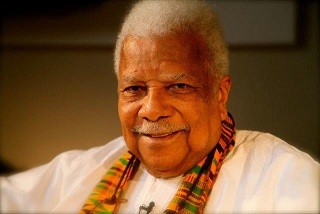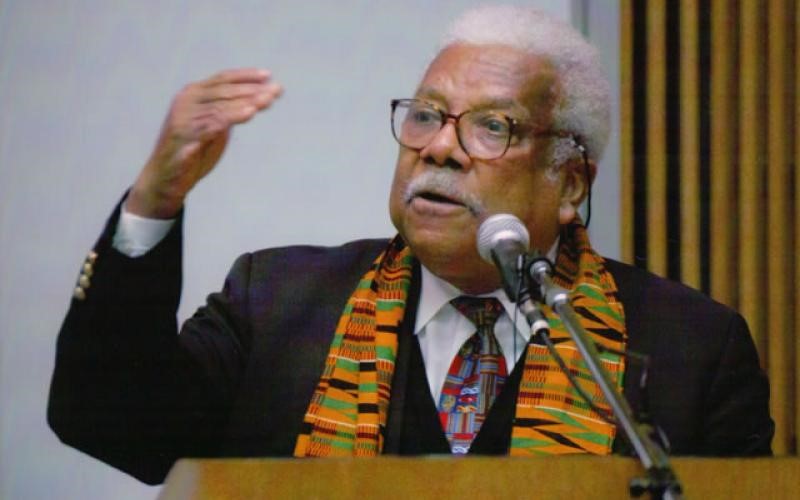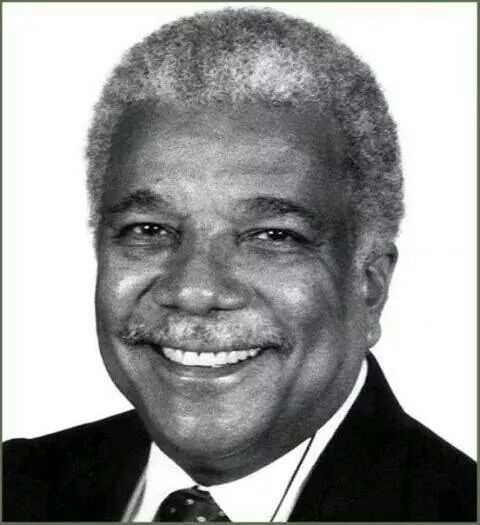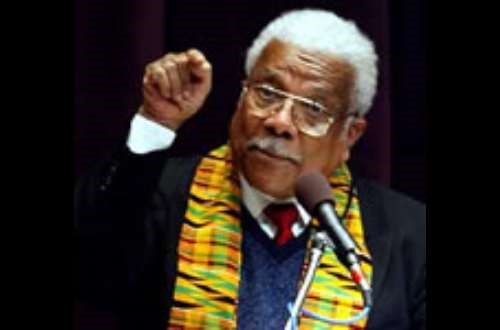Ali Al’amin Mazrui was a Kenyan born American academic, professor and political writer on African and Islamic studies and also on North South relations.
1933
2014
Mombasa, Kenya
Kenyan
Millennium Tribute for Outstanding Scholarship, House of Lords, Parliament Buildings, London, June 2000
Special Award from the Association of Muslim Social Scientists (United Kingdom), honouring Mazrui for his contribution to the social sciences and Islamic studies, June 2000
Honorary Doctorate of Letters from various universities for fields which include Divinity, Humane Letters, and the Sciences of Development
Icon of the Twentieth Century, elected by Lincoln University, Pennsylvania, USA 1998
Appointed Walter Rodney Professor, University of Guyana, Georgetown, Guyana, 1998
Icon of the Twentieth Century Award, Lincoln University, Lincoln University, Pennsylvania, 1998
DuBois-Garvey Award for PanAfrican Unity, Morgan State University, Baltimore, Maryland, 1998
Appointed Ibn-Khaldun Professor-at-Large, Graduate School of Islamic and Social Sciences, Leesburg, Virginia, USA 1997–2001
Distinguished Faculty Achievement Award, University of Michigan, Ann Arbor, Michigan, USA 1988
Appointed Distinguished Andrew D. White Professor-at-Large, Cornell University, Ithaca, New York, USA (1986–1992)
Rumi Forum Extraordinary Commitment to Education Award, 2013
Mazrui was ranked among the world’s top 100 public intellectuals by readers of Prospect Magazine (UK) Foreign Policy Magazine (Washington, D.C.) (see The 2005 Global Intellectuals Poll).
Mazrui attended primary school in Mombasa, where he recalled having learned English specifically to participate in formal debates, before he turned his talent to writing. Journalism, according to Mazrui, was the first step he took down the academic road. In addition to English, Mazrui also spoke Swahili and Arabic. After getting a Kenyan Government scholarship, Mazrui furthered his study and obtained his BA with Distinction from Manchester University in 1960, his MA. from Columbia University in New York in 1961, and his DPhil from Oxford University (Nuffield College) in 1966. He was influenced by Kwame Nkrumah’s ideas of pan Africanism and consciencism, which formed the backbone of his discussion on Africa’s Triple Heritage (Africanity, Islam and Christianity)
Mazrui began his academic career at Makerere University in Uganda, which he had dreamed of attending since he was a child. At Makerere, Mazrui served as a professor of political science, and began drawing international acclaim. Mazrui felt that his years at Makerere were some of the most important and productive of his life.
Mazrui reflected that he felt forced to leave the University of Makerere, possibly as a result of his desire to remain a neutral academic in the face of pressures to attach his growing prestige as a political thinker to one of the regional factions. His first solicitation was from John Okello, the leader of the Zanzibar Revolution, who came to Mazrui’s house in 1968 to urge Mazrui to join his cause. Okello originally tried to convince Mazrui to become an advisor to him and then tried to enlist Mazrui’s assistance in the writing of a constitution for Zanzibar. Mazrui told Okello that, while he was inclined to sympathize with the cause, it would be a violation of the moral duty of a professor and an academic to join with a political agenda. This incident shows the level of international prestige that Mazrui had already accumulated. Okello had sought him out specifically because he knew and valued Ali’s reputation as an anti-imperialist intellectual.
Mazrui was later approached by Idi Amin who was the president of Uganda at the end of Mazrui’s time at Makerere. Amin, according to Mazrui, wanted Mazrui to become his special adviser. Mazrui declined this invitation, for fear that it would be unsafe, and by doing so lost his political standing in Uganda. This would be why Mazrui ultimately felt forced to leave the University of Makerere. Mazrui often said that he would like to return to Uganda, but cited his strained relationship with the Ugandan government, as well as the unfriendliness of the Ugandan people towards a Kenyan political scientist as the factors keeping him away.
In 1974, Mazrui was hired as a professor of political science at the University of Michigan. During his time at Michigan, Mazrui also held a professorship at the University of Jos in Nigeria. He spent time teaching and being part of the discourse in Africa, which was important to not losing his understanding of the African perspective. From 1978 until 1981 Mazrui served as the Director of the Centre for Afro American and African Studies (CAAS) at the University of Michigan. While he had a relatively quiet tenure in the chair, his presence there was important. It was a central view of Mazrui’s that the African American and the African connection had to be strengthened. He believed the way to better Africa was to educate African Americans in global politics and to strengthen their connection with Africa, all things that could be overseen by CAAS. However, he also seemed to doubt the ability of a program like CAAS to accomplish their objects. During his earlier years at the University of Michigan he criticised such programmes saying that, in response to Black activism “some universities just established a Black studies program with a kind of political cynicism which I found rather difficult to admire, to say the very least.”
Mazrui taught at the University of Michigan until 1989, when he took a two year leave of absence to accept the Albert Schweitzer professorship at SUNY Binghamton. Mazrui’s departure from the University of Michigan was no less eventful than his departure from Makerere. Mazrui announced his resignation from the University of Michigan on 29 May 1991. Leading up to this point, there had been a highly publicised bidding war between U of M and SUNY. Reportedly, SUNY offered Mazrui a $500,000 package which included a $105,000 salary (as compared to his $71,500 salary at U of M) as well as the funds for three professors of Mazrui’s choosing, three graduate assistants, a secretary, and travel expenses. The University of Michigan reportedly matched this offer, but Mazrui decided it was too little too late. He stated that he was unconvinced by U of M’s commitment to the study of political science in the third world. Both governor Mario Cuomo from New York and Governor James Blanchard from Michigan gave Mazrui personal calls to convince him to choose the university in their states. The whole affair sparked questions about the commodification as well as the celebrity of university professors.
His departure also caused a conversation about racial diversity at the University of Michigan; a conversation he had not been a huge part of for the fifteen years while he was on the U of M campus. In spite of the University of Michigan’s efforts to retain Ali Mazrui, James Duderstadt, the president of the university at the time, came under heavy fire for not being proactive enough in the retention of an esteemed Black professor. Mazrui had been hired in 1974, while the university was under heavy criticism, especially from the second Black Action Movement, for not keeping its promises for diversity in the student body and among the faculty. In contrast, Duderstadt argued that, by 1989, the University was doing a much better job of diversifying. They had added 45 minority faculty that year, 13 more than the year before and the College of Literature, Science and the Arts had seen “skyrocketing minority recruitment.” Even still there was a worry that the university was focusing only on recruiting minorities, and not on making them stick around
Spouses – Molly Vickerman, Pauline Uti
Children – 5
Siblings – Salma Mazrui. Harith Mazrui
https://en.wikipedia.org/wiki/Ali_Mazrui accessed 21/03/2022
https://www.britannica.com/biography/Ali-Al-Amin-Mazrui accessed 21/03/2022
https://www.brookings.edu/blog/africa-in-focus/2014/10/15/in-memoriam-intellectual-ali-mazrui-1933-2014/ accessed 21/03/2022
https://www.azquotes.com/author/36236-Ali_Mazrui accessed 21/03/2022





